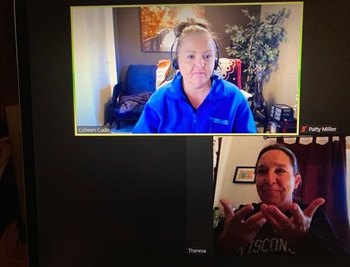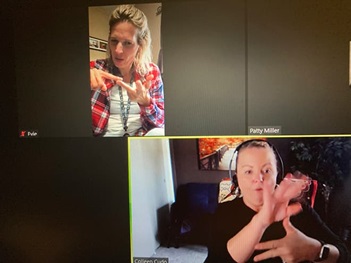Recent Posts
Beyond words: ASL interpreter creates bridge between deaf patients, healthcare

Even the most routine medical appointment can be stressful for patients. Now imagine that you can't hear what healthcare professionals are saying while you're giving birth, learning that you have a serious health problem, accompanying your children or elderly parents to their appointments, or coping with unfamiliar medical terms.
While some deaf people can lip-read, there are still barriers. For example:
- Being ill or groggy from anesthesia can complicate visual communication.
- If a healthcare professional is wearing a mask, lip reading isn't possible, and essential aspects of the message, like facial expressions, aren't available.
- Medical terms may be hard to understand.
- Some words or letters can be difficult to distinguish, such as meet and met, or the letters T, D and K.
- The healthcare staff may turn away while talking.
- There may be a side conversation concerning your issue.
"Lip reading takes a lot of brain power because it's so intense, and it can be exhausting," says Theresa Lewis of West Salem, Wisconsin. "You can miss a lot of what's being communicated."
Theresa and her husband both are deaf, and Theresa often accompanies him and her 93-year-old mother-in-law to medical appointments. So she also needs to know about any follow-up care, prescriptions and updates on her mother-in-law's health.

"Having an in-person interpreter with us makes sure that we're getting the whole picture and 100% of what we need to know," says Theresa.
Evie Seifert of Sparta, Wisconsin, has three daughters ages 17, 15 and 7. Evie is deaf, but her children can hear. Like any parent, she accompanies them to their healthcare appointments, whether for routine care and immunizations or something more serious like a broken arm.
"I want to make sure that I can follow up on what their providers say," Evie says. "When reading lips, you can never take your eyes off the person speaking, and I worry about missing something. I want to have the same access to information as my daughters."
Enhancing healthcare communication, understanding
Enter Colleen Cudo, supervisor for Language Services for Mayo Clinic Health System in La Crosse, Wisconsin, who works with Theresa and Evie. Fluent in American Sign Language, or ASL, Colleen has more than 30 years of experience as an interpreter. She explains that ASL is a combination of letters, words, body language and facial expressions to enhance communication.
"English and ASL are like two different languages," Colleen says. "As interpreters, we consider ourselves word nerds. We work hard to know what we're scheduled for and do our homework about medical terminology that may come up during an appointment, so we're prepared. During an office visit, we also get clarification from our client's healthcare professionals and present it in terms our client will understand."
For instance, a healthcare professional may ask, "When was the first day of your last period?" But, Colleen says, that doesn't make sense in sign language, so the most common way to pose the question is, "When did your most recent period start?"
Colleen and the other in-person interpreters consider themselves just that: interpreters. They're the third person in the room and are careful not to add an opinion or insert themselves in any other way between the patient and healthcare professional. They also strictly uphold patient privacy.
But they're still compassionate with the message. "We do more than interpret," Colleen says. "Sometimes we're communicating bad news, such as a serious condition or even life-ending diagnosis. Through our signing and body language, we can convey not only the words but also our empathy."
While there are tools for helping with interpretation, such as tablets and smartphones, those tools aren't always effective in certain healthcare settings. They also can experience delays or freeze, leaving the patient without access to vital information or instructions. It's also not appropriate for the healthcare team to rely on a family member, such as a child, to interpret for a patient.
Theresa says, "I've been asked why my son can't interpret, but he's not a certified medical interpreter, and I want to keep my conversations private. Having my son at a mammogram? No way."
Being there for patients
Whether in the Emergency Department or Birthing Center, Colleen and other interpreters are there for their clients, often providing their services any time of the day and night.
Colleen was at Evie's side when her youngest daughter was born.
"It was wonderful, and my labor was fast," Evie says, "but there were so many people in the room and so much going on. Colleen was my support system, providing interpretation for words I didn't understand. She was so impressive. I can't imagine what it would have been like if she hadn't been there."

Evie confesses that when she first started seeing healthcare staff at the clinic, she didn't use an in-person interpreter because she didn't feel comfortable having a stranger at her office visits. Instead, she and her care team communicated by writing, which had its own drawbacks, leading to some miscommunication.
"It was a lot of writing, mostly with our smartphones," she says. Then she met Colleen.
"We became close, and I totally trust her," Evie says. "I trust her confidentiality and medical knowledge, and appreciate her accessibility. I also know that having her interpret reduces confusion and increases understanding."
Theresa feels the same way.
"Having an in-person interpreter helps me communicate better with my providers. I trust Colleen to make sure we all understand each other," she says.
That's one of the satisfactions Colleen gets from interpreting for her clients.
"It's so amazing and rewarding when someone's face lights up because they understand what's being said," she says.
Gaining that understanding is something Evie appreciates. "I never take accessibility for granted," she says. "Mayo Clinic is world-class, and offering in-person interpretation makes it world-class for all patients."





